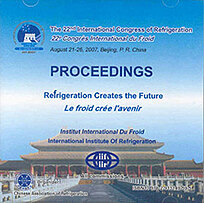
Summary
Thermostatic flow controller (TFC) is a new flooded-evaporator-technology, usable for all sizes of plants and all refrigerants, except those with big temperature glide. The flow to the evaporator is controlled by the receiver pressure, which is controlled by a heat exchanger, without any moveable parts. Compared to a thermostatic expansion valve the other components, especially the evaporator, are exploited better, improving the cost-benefit relation. TFC is robust, reliable, does not need servicing, and can be located in inaccessible places. For small cooling and frost application, the heat exchanger is just a small tube, which also acts as a receiver. The amount of circulating refrigerant automatic adjusts to current conditions and the application can be moved freely between cold and warm locations. A flooded evaporator increases the cooling effect and COP, and for most refrigerants the heat exchanger does the same, in all the COP increase 8-17%, depending on the type of refrigerant. The improvement comes from a more efficient cooling circuit and adds to all other energy saving measures. According to the IIR, the world uses 15% of all electrical energy produced for cooling and air conditioning. Reducing this by 8-17% equals 1-2% of all electrical energy - corresponding to several big power plants - and that's without extra use of other resources. TFC was tested thoroughly for several years, in polar and tropical territories, for cooling and frost applications, and for small and big cooling effect (100 W-40 kW).
Available documents
Format PDF
Pages: ICR07-B1-774
Available
Public price
20 €
Member price*
Free
* Best rate depending on membership category (see the detailed benefits of individual and corporate memberships).
Details
- Original title: Low-cost, energy saving, flooded-evaporator-technology.
- Record ID : 2007-2075
- Languages: English
- Source: ICR 2007. Refrigeration Creates the Future. Proceedings of the 22nd IIR International Congress of Refrigeration.
- Publication date: 2007/08/21
Links
See other articles from the proceedings (839)
See the conference proceedings
-
Koudesystemen met natuurlijke circulatie.
- Date : 2004/06
- Languages : Dutch
- Source: Koude & Luchtbehandeling - vol. 97 - n. 6
View record
-
Cascade refrigeration system employing NH3 and ...
- Author(s) : JENSEN S., SKRLIN M.
- Date : 2008/09/07
- Languages : English
- Source: 8th IIR-Gustav Lorentzen Conference on Natural Working Fluids (GL2008)
- Formats : PDF
View record
-
Heat pipe can control humidity, reduce biologic...
- Author(s) : BECKWITH W. R.
- Date : 1995/11/27
- Languages : English
- Source: Air Cond. Heat. Refrig. News - vol. 196 - n. 13
View record
-
Single temperature sensor superheat control usi...
- Author(s) : VINTHER K., RASMUSSEN H., IZADI-ZAMANABADI R., et al.
- Date : 2013/05
- Languages : English
- Source: International Journal of Refrigeration - Revue Internationale du Froid - vol. 36 - n. 3
- Formats : PDF
View record
-
CONTROL OF LIQUID CIRCULATION IN FORCED CIRCULA...
- Author(s) : LASSEN O.
- Date : 1983/09
- Languages : German
- Source: Kälte + Klimatechnik (Die) - vol. 36 - n. 9
View record
